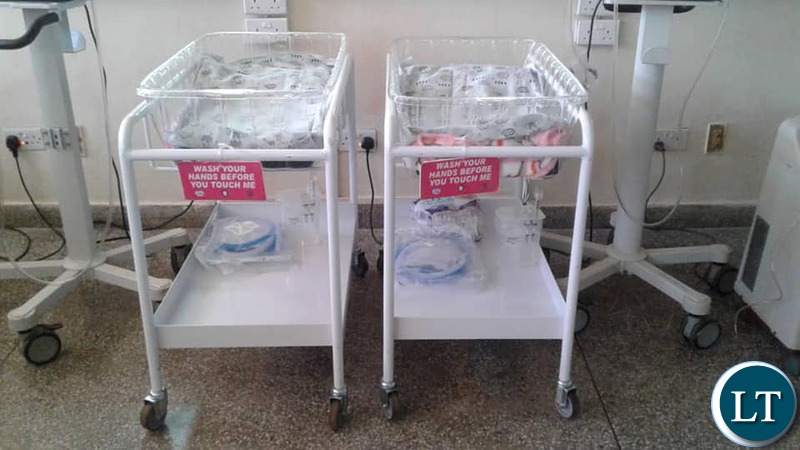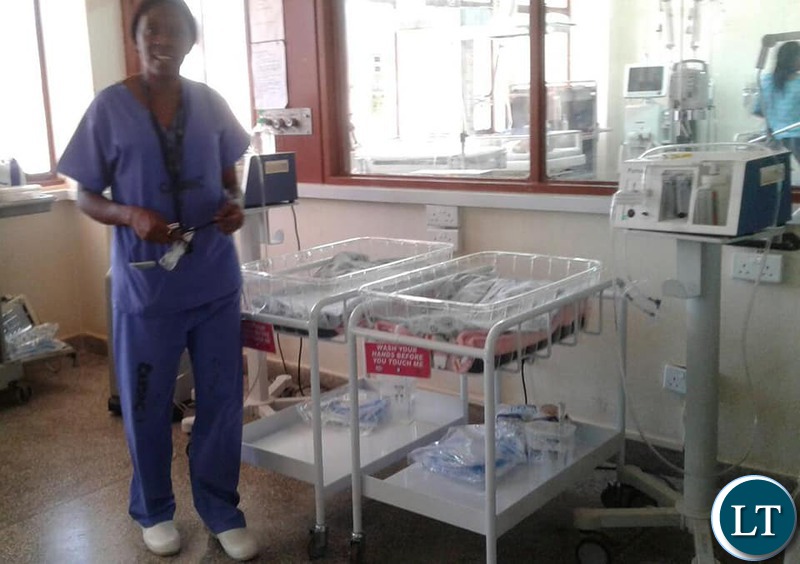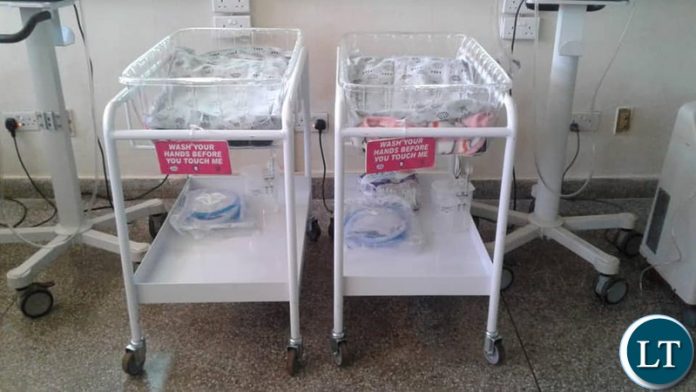
A Zambian teenager living in South Africa donated 10 baby bassinets to the Neonatal Intensive Care Unit at UTH.
Mwenda Phiri a grade 11 pupil and founder of the Mwenda Phiri Initiative said he was humbled to see the bassinets in use when nursing staff sent him photos of the bassinets.
“We received these heart warming pictures of some of the baby bassinets that the Mwenda Phiri Initiative donated to the Neonatal Intensive Care Unit of the University Teaching Hospital in Lusaka, Zambia . It’s very humbling to see them in use.
My mum told me that when I was born I spent 8 days in this Neonatal unit (also known as D-Block) due to some minor complications. She shared that the doctors and nurses work very hard and often with limited equipment, trying to save babies in the unit, most of whom are in very delicate state . And so I’m very grateful that we were able to donate the 10 baby bassinets to help ease their work and support the mothers and babies.”


A Sickle cell crisis in 2017 led Mwenda Phiri establish the Mwenda Phiri Initiative
Zambian-born, Mwenda Phiri, was diagnosed with sickle cell aneamia at 9 months of age by his late great grandfather, Professor Chifumbe Chintu – a former haematologist and oncologist at the University Teaching Hospital in Lusaka. Were it not for him, Mwenda’s Sickle Cell Anaemia may have remained undiagnosed and killed him.
I have sickle cell anaemia also known as Sickle cell disease. Sickle cell disease is not contagious,” he says.
Before the 2017 crisis, Mwenda last had a major crisis when he was three years old, but since then, his family has been very proactive with his care by ensuring that they work to prevent conditions that trigger any crisis like managing extreme weather, dehydration and infection proactively.
However the Acute Chest syndrome he suffered in 2017 after an appendectomy almost took his life and changed his whole outlook on life.
“I was fortunate to have access to specialist doctors, equipment, medicine and facilities that saved me,” Mwenda says. Getting the excellent treatment and care for sickle cell survivors especially children is a far-fetched dream for many not only in Zambia, but Africa as a whole.
Because of this, Mwenda started the Mwenda Phiri Initiative (MPI) in service of child health to raise awareness and funds for paediatric haematology and ICU in Africa.
MPI raises funds for hospitals and support groups in Zambia as well as bursaries for further studies in haematology for Zambian medical doctors.
“Because of my condition as a sickle cell survivor, I learnt that I am actually among the privileged few whose parents can afford great health care,” he says.
After being discharged from the hospital following the crisis, Mwenda took up the challenge and researched to find out how many children in Zambia and Africa have or do not have the luxury of finding doctors, equipment and sundries required to treat children with sickle cell disease.
About Sickle cell anemia
Sickle cell anemia is an inherited form of anemia — a condition in which there aren’t enough healthy red blood cells to carry adequate oxygen throughout your body.
Normally, your red blood cells are flexible and round, moving easily through your blood vessels. In sickle cell anemia, the red blood cells become rigid and sticky and are shaped like sickles or crescent moons. These irregularly shaped cells can get stuck in small blood vessels, which can slow or block blood flow and oxygen to parts of the body.
The difference between sickle cell anemia and sickle cell trait
A person can have a mixture of normal and faulty hemoglobin in their red blood cells without having sickle cell disease. This condition is called “sickle cell trait.” People with sickle cell trait have enough normal hemoglobin in their red blood cells to prevent the cells from sickling. Sickle cell trait is protective against malaria.
It’s important to remember that people with sickle cell trait do not have sickle cell disease. They also usually do not develop sickle cell disease, except in unusual circumstances. However, people with sickle cell trait can genetically pass the trait to their children. If two people with sickle cell trait have children together, there is a 1 in 4 chance that their children will have sickle cell anemia.
Chances that a child will be born with sickle cell anemia or sickle cell trait
If you and your partner both have sickle cell trait, your child has a 25% chance of being born with sickle cell anemia. If only one of you has sickle cell trait, your child cannot be born with sickle cell anemia, but there is a 50% chance that your child will be born with sickle cell trait.If one parent has sickle cell disease and one parent has sickle cell trait, there is a 50% chance that their children will be born with sickle cell disease.
Symptoms and complications of sickle cell anemia
- Periods of pain that can last a few hours to a few days.
- Blood clots.
- Swelling in hands and feet.
- Joint pain that resembles arthritis.
- Life-threatening infections.
- Anemia (decrease in red blood cells)
As recently as 1973, the average lifespan for people with sickle cell anemia was only 14 years. Today in places with good health care, life expectancy for these patients is 50 years and beyond .



Wow, how heartfelt!!
Difficult to imagine that we still have such little angels in our midst!
This is what young people must concentrate on not rioting and damaging peoples cars, drinking chibuku and shouting slogans, roaming the streets with no aim at all.
Weldone youngman!
Kudos Mwenda!! May you be abundantly blessed. Now imagine how many baby bassinets PF govt would buy and distribute to hospitals country wide had it not been for their evacuations of old good for nothing politicians?
The first sensible thing you have said Mr cadre!
Well done young man. One does not have to be a Peopleless Personal Party President to do good in society.
I am concerned.
Bassinets in Neonatal Intensive Care?
By definition, intensive care means that the patient cannot be left alone without ventilator and other support.
A bassinet is just a cot bed. What would it be doing in NICU?
Great kid … Life Is About Purpose Not Position!!
Very proud of you.
Let’s roll …
Outstanding young man. What’s his website. I want to donate an incubator.
Wonder boy, more wiser than all PF ministers.
God sent that boy to share joy of life.
…… We spend so much time listening to evil and trib.als…., corrupt politicians, political lies, ……. sil.ly reasons for depreciating kwacha etc etc. And almost never hear about good people.
This is a very noble cause, Mwenda. Please keep it up and I can only wish you the best in every program you embark on. Congratulations
It is time to make my NGO known starting with good to ophanages 500 dollars for a start
It doesn’t have to be known, just do good!
We all can do noble things which can help society greatly. The problem is that for the majority of us, the mindset to make these contributions is not there yet. One basic thing which can be done is donate blood to the hospital on a regular basis, say twice a year. Those with technical skills, can render some of their services to the hospital to maintain some of the medical equipment that is gathering dust or need repair, painting, etc. These are my thoughts. One Zambia One Nation.
Medical students who are supposed to render services to short staffed medical institutions are meant to pay. What a country !!!
This young man puts us all to shame, he has taught us something, we can all work together to improve our county. We don’t have to spend millions, but collectively we can raise millions.
This is really good young man. God bless you and your family. Government thanks for accepting the gift. God bless whoever was involved in the process of receipt.
Fantastic news! I just wonder why those guys making Gates and all sorts don’t think of making these things? I guess it’s time to open up a workshop.
This ma rubbish , how can an 11years boy have money to buy those buskets? He must be a TONGA BOY BEING USED BY THAT KANGAROO UPND FUNDRAISING COMITTEE IN SA? stop using the boys name let him concentrate at school and wish him full recovery from sickle cell. Too young to have an initiative lke this at 11 ONLY
Anyoko you have a point it is a strategy
It is a lie that having sicke cell trait you are protected from malaria. I am a sickle cell carrier card holder and I have had malaria many times in my life. Please correct that statement, it is misleading.
Your skin offers protection against diseases that doesn’t mean you don’t get sick.In the same way sickle cell trait offers some protection against the malaria parasite plasmodium falciparum. -Your red blood cells that are sickled arrest the growth of intraerythropoetic plasmodium falciparum. It could be there is low oxygenation in those cells which the parasites do not like. However ,your healthy red cells can get attacked by malaria parasites ,so you can get malaria but not as bad as it would have been had you not been a sickle cell carrier.
GBM NEEDS TO DO THAT NOT TALKING ABOUT HH
Future President wa Zambia banono mwaiche donating without kudwamo. Job well done. Next to donate ni ba mudala ba Jay Jay bali ku bulaya
Jay Jay you been shown how it is done lol
Comments are closed.